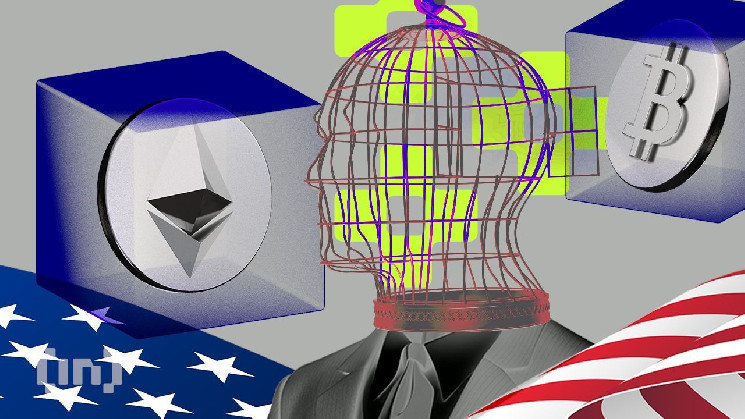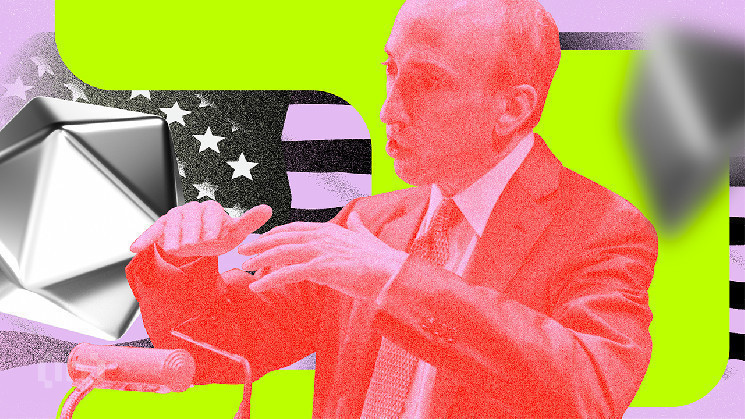Crypto Czar: What Does David Sacks’ New White House Role Mean for the Market?

As President-elect Donald Trump prepares to take over the White House next year, expectation surrounding David Sacks’ role as the United States’ crypto czar grows in the cryptocurrency sector.
In a conversation with BeInCrypto, industry leaders Ryan Chow of Solv Protocol and Kadan Stadelmann of Komodo expressed their optimism about Sacks’ appointment, expecting favorable changes toward a more industry-friendly regulatory environment.
Crypto Industry Embraces Sacks Appointment
Earlier this month, Trump appointed Sacks, a seasoned entrepreneur and investor with over two decades of Silicon Valley experience, as the White House cryptocurrency and AI czar.
Sacks brings extensive experience to this role, having served as PayPal’s founding COO and a fellow member of the PayPal Mafia. He later founded Yammer, an enterprise software platform that Microsoft subsequently acquired for $1.2 billion.
The crypto community holds high expectations for Sacks and expects him to guide the development of a unified national approach to policymaking and positioning the United States as a leader in emerging technologies.
“Sacks is expected to advocate for clearer guidelines that would benefit blockchain firms, potentially reducing compliance burdens and encouraging investment in digital assets,” Brian Chow, CEO of Solv Protocol, told BeInCrypto.
As an early and vocal proponent of cryptocurrency, Sacks approved of Trump’s efforts to engage with leaders in the sector. After his appointment, he expressed excitement in an X post over the possibility of advancing American competitiveness in emerging technologies.
“One of Sacks’ primary responsibilities will be to establish a legal framework for cryptocurrency that provides much-needed clarity to an industry often plagued by regulatory uncertainty. His appointment may signal that the Trump administration aims to implement business-friendly regulations that could foster innovation in the blockchain sector. This aligns with Trump’s campaign promises to position the US as a leader in technology and cryptocurrency,” Chow added.
Given his long-standing enthusiasm for cryptocurrency, Sacks now has the opportunity to influence the development of industry-friendly regulations.
Dismantling Gary Gensler’s “Overly Aggressive” Regulations
The incoming ‘crypto czar’ is also known in part for his vocal contempt toward current Securities and Exchange Commission (SEC) chair Gary Gensler’s regulatory approach to digital assets.
Under Gensler’s leadership, the SEC adopted an aggressive regulatory approach, targeting major crypto firms and exchanges. While aiming to protect investors, these actions generated friction within the industry, with stakeholders arguing that they hindered innovation and created regulatory uncertainty.
The United States currently lags behind countries like the UAE and Singapore in providing clear regulatory frameworks for the cryptocurrency industry.

According to Chow, as Trump’s crypto czar, Sacks can effectively influence the development of clear regulatory guidelines for digital assets.
“Sacks is expected to advocate for clearer guidelines that would benefit blockchain firms, potentially reducing compliance burdens and encouraging investment in digital assets,” Chow shared.
Sacks is now tasked with deciding whether the United States will be a leader in blockchain innovation or risk creating further regulatory uncertainty within the crypto industry.
An Undefined Role
Though Sacks promises a crypto agenda, the responsibilities of a ‘crypto czar’ remain uncertain.
“The ambiguity surrounding Sacks’ role — being part-time and not requiring Senate confirmation — raises questions about his capacity to enact significant policy changes,” Chow said.
Despite this ambiguity, Trump’s appointment of pro-crypto individuals to key seats of his incumbent administration will more easily foster a regulatory environment conducive to digital innovation.
“The choice of Sacks, alongside Paul Atkins as SEC Chair, indicates a move away from the enforcement-heavy policies seen during the Biden administration,” Chow noted.
In addition to Atkins, Trump picked Stephen Miran, a former Treasury official during his first administration, to chair the Council of Economic Advisors (CEA). As the name suggests, the Council serves as an advisory body to the President on economic matters.
Miran is a vocal advocate for cryptocurrency who has previously called for regulatory reforms in the United States. As CEA chair, he will analyze economic trends, develop economic growth strategies, and evaluate the effectiveness of existing policies.
Meanwhile, Trump appointed Bo Hines, a former congressional candidate, Executive Director of the Presidential Council of Advisers for Digital Assets. Hines will collaborate with Sacks to develop a regulatory framework that balances innovation and consumer protection. Nonetheless, the crypto industry expects Sacks to leverage decision-making.
“Although Sacks’ role is advisory and part-time, his close relationship with Trump positions him to influence key policy decisions affecting both AI and cryptocurrencies,” Chow added.
The Extent of Sacks’ Influence
In a conversation with BeInCrypto, Komodo Platform CTO Kadan Stadelmann, expressed that, at the end of the day, Trump himself will be able to wield the most power over crypto policies.
“By giving the crypto industry his blessing, Donald Trump himself can do plenty to help the US catch up with countries where regulatory clarity is already the order of the day. Sacks can certainly advise, and perhaps help nudge other branches of government to get in line with the President’s vision,” Stadelmann said.
While Sacks is a good addition, his appointment isn’t indispensable in shaping regulations, according to Stadelmann.
“Donald Trump’s re-election could be grounds for companies to return to the US, especially as he promises 15 percent tax rates for corporations. Sacks’ appointment is an afterthought,” he added.
The crypto industry will see various policy changes alongside the appointment of a new SEC chair. This includes executive orders that would facilitate greater access to banking services for crypto firms, the appointment of crypto-friendly individuals to key government positions, and even the establishment of a possible strategic Bitcoin reserve.
Uncertainty Over CBDCs
The conversation surrounding a more friendly approach to digital assets also leads to the topic of Central Bank Digital Currencies (CBDCs). Central banks issue and regulate CBDCs, which are digital forms of money. Unlike cryptocurrencies, CBDCs are intended to coexist with physical currency, rather than replace it.
Recognizing the digitization of money and payments, central banks worldwide have increasingly explored the development of CBDCs to ensure their continued relevance in a changing virtual financial world.
“While Sacks is not explicitly tasked with developing a CBDC, his influence on crypto policy could shape discussions around it. A CBDC could be seen as a government response to the rise of private digital currencies, potentially leading to increased scrutiny and regulation of these assets,” Chow told BeInCrypto.
Given that the Trump administration has to comply with a long list of crypto-friendly policies, CBDCs may not be at the top.
“Sacks’ preference for deregulation might slow down or complicate any moves toward establishing a CBDC, as he may prioritize enhancing the existing crypto ecosystem over introducing government alternatives,” Chow added.
How much control Sacks has over creating US-back digital currency remains a question.
“Critics argue that his ability to influence major decisions regarding CBDCs or private cryptocurrencies could be limited without formal authority or oversight. It’s likely that CBDC will be brought up for discussion during his tenure, but in the end, well-regulated digital assets may still be the preferred choice,” Chow said.
Whether Trump wants to create a digital dollar is another obstacle for hopeful CBDC enthusiasts. In January, Trump delivered a speech in New Hampshire pledging that as President, he “would never allow the creation of a Central Bank Digital Currency,” referring to it as “very dangerous” and a form of “government tyranny.”
Only time will tell if Trump’s stance will remain the same.




 Bitcoin
Bitcoin  Ethereum
Ethereum  Tether
Tether  Dogecoin
Dogecoin  USDC
USDC  Cardano
Cardano  TRON
TRON  Chainlink
Chainlink  Stellar
Stellar  Hedera
Hedera  Bitcoin Cash
Bitcoin Cash  LEO Token
LEO Token  Litecoin
Litecoin  Cronos
Cronos  Ethereum Classic
Ethereum Classic  Monero
Monero  Dai
Dai  OKB
OKB  Algorand
Algorand  Cosmos Hub
Cosmos Hub  Stacks
Stacks  Theta Network
Theta Network  Gate
Gate  Maker
Maker  Tezos
Tezos  KuCoin
KuCoin  IOTA
IOTA  NEO
NEO  Zcash
Zcash  Polygon
Polygon  Synthetix Network
Synthetix Network  Tether Gold
Tether Gold  TrueUSD
TrueUSD  Dash
Dash  Holo
Holo  Zilliqa
Zilliqa  0x Protocol
0x Protocol  Enjin Coin
Enjin Coin  Basic Attention
Basic Attention  Qtum
Qtum  Siacoin
Siacoin  Ravencoin
Ravencoin  Decred
Decred  NEM
NEM  Ontology
Ontology  Huobi
Huobi  DigiByte
DigiByte  Hive
Hive  Nano
Nano  Status
Status  Bitcoin Gold
Bitcoin Gold  Waves
Waves  Lisk
Lisk  Steem
Steem  Numeraire
Numeraire  Pax Dollar
Pax Dollar  BUSD
BUSD  OMG Network
OMG Network  Ren
Ren  Bitcoin Diamond
Bitcoin Diamond